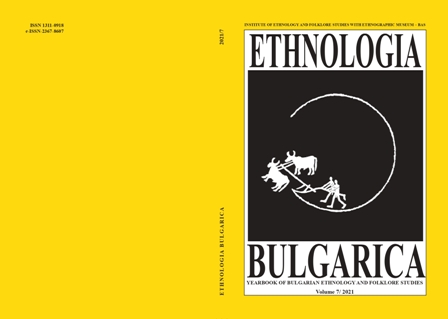Traces of the Heroic Time: the Well of Angelush and the ‘Radetzki’ Steamship
Traces of the Heroic Time: the Well of Angelush and the ‘Radetzki’ Steamship
Author(s): Nikolai NenovSubject(s): History, Anthropology, Cultural history, Customs / Folklore, Sociology, Ethnohistory, Local History / Microhistory, Oral history, Social history, Modern Age, Recent History (1900 till today), Cultural Anthropology / Ethnology, Culture and social structure , 19th Century
Published by: Институт за етнология и фолклористика с Етнографски музей при БАН
Keywords: sacred site; healing spring; Botev’s rebel band; ‘Radetzki’ steamship; national history
Summary/Abstract: The article traces the regained popularity of a healing water source, promoted by the feigned healer and wonder-worker Angelush. The activities of Angelush are connected with the appearance of the Great Comet, observed in Europe in 1861. Many newspapers from this period reflect the miracles and the impressive crowds of people that visited the healing water source in Northeast Bulgaria, near the Danube River. The present-day ‘intervention’ in media background seems to result from the need of shedding light on the visible traces of the ‘heroic time, which are pertinent due to the proximity to the anniversary of the April 1876 uprising and to the exploit of Hristo Botev’s rebel band and the use of ‘Radetzki’ steamship in the same year. The text analyses a concrete case of inventing tradition, which appears necessary for present-day political and social purposes. The significance of the Well of Angelush as a sacred place is constructed entirely in media background, creating the myth that ‘Radetzki’steamship was built with the money earned from transporting visitors to the healing water source. In this case, the theme of the ‘heroic time’ and the immediate relation with the national narrative is used to testify the significance of a religious site, the belief in which should be a sufficient justification for its existence. Thus, in the 21st century, we witness how an increasing number of churches and monasteries in Bulgaria construct their past through the links they establish with nationally significant topics, characters and images. They do so by emphasizing not that much the spiritual and religious aspects – as connected with faith or with sacred scriptures, but rather – with the presence of traces of the heroic time, which inscribe the cult sites in the toponymic space of the nation.
Journal: ETHNOLOGIA BULGARICA. Yearbook of Bulgarian Ethnology and Folklore
- Issue Year: VII/2021
- Issue No: 1
- Page Range: 14-25
- Page Count: 12
- Language: English
- Content File-PDF

